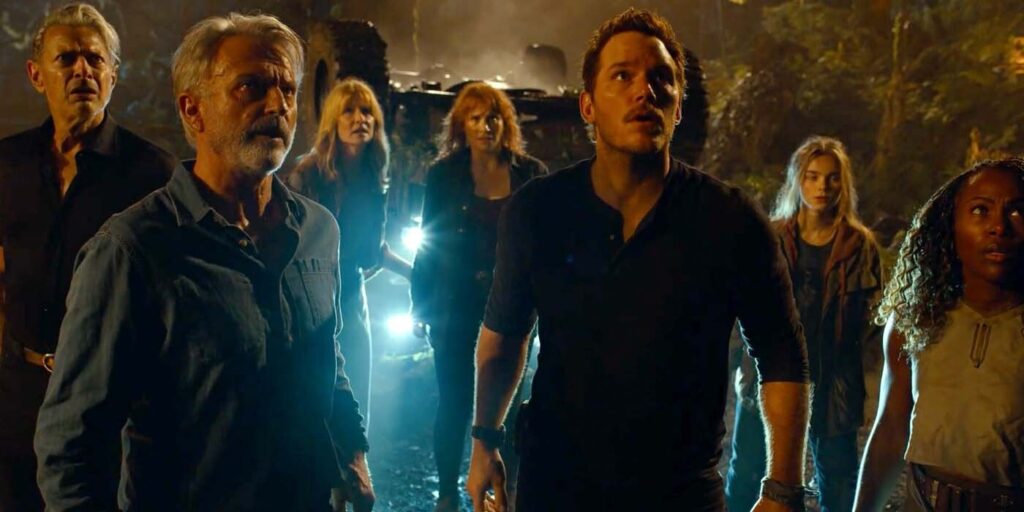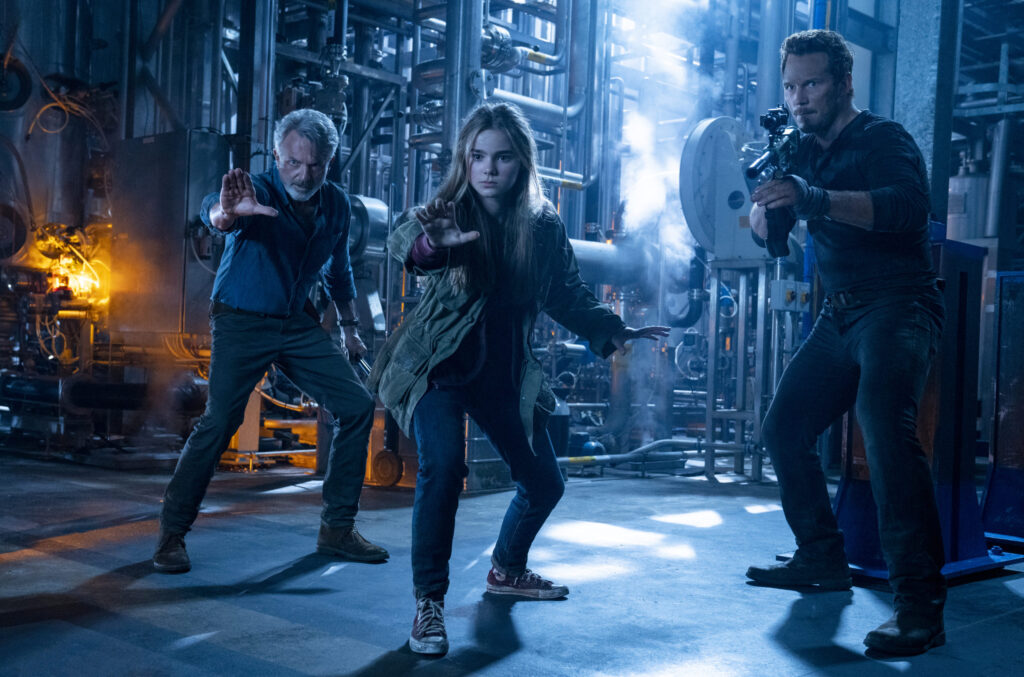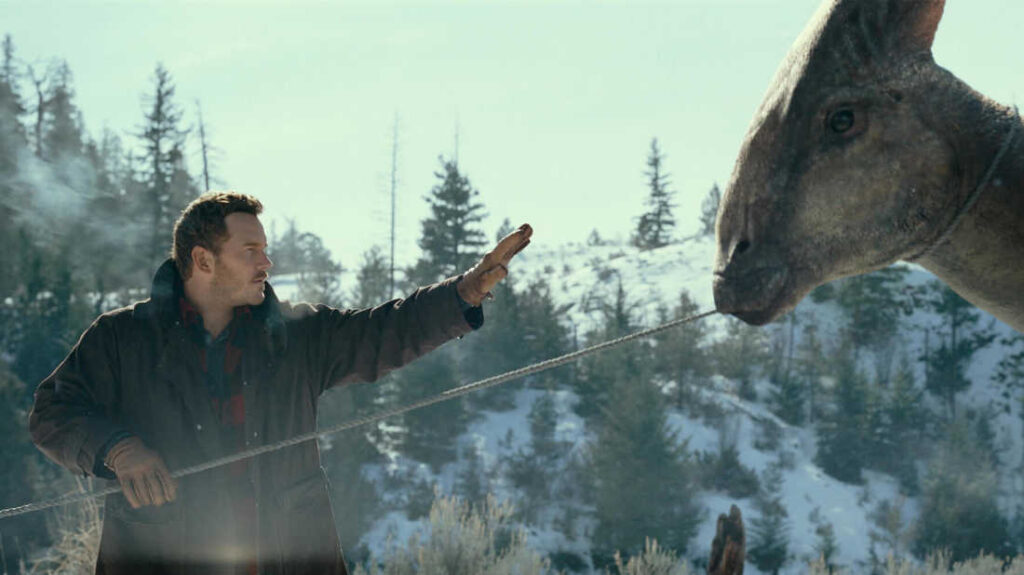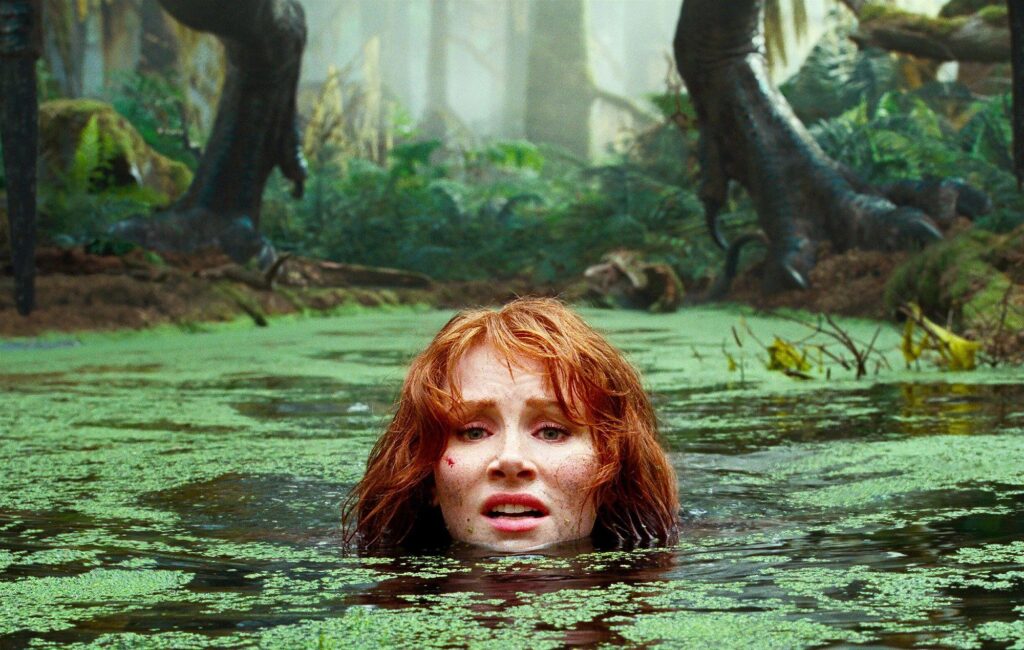
You remember Ellie Sattler, right? She was one of the visitors to the original Jurassic Park, the one whose open-mouthed awe gave way to gasps of horror when she discovered that Samuel L. Jackson’s reassuring hand was attached to nothing more than a bloody stump. Everyone’s favorite paleobotanist, Sattler is back in Jurassic World Dominion, at one point hunching down to peek at a cuddly-looking computer-generated baby critter and murmuring, in a reverent tone, “You never get used to it.”
Don’t you, though? The failed bet of this heaving, sporadically entertaining movie, which was directed by Colin Trevorrow from a script he wrote with Emily Carmichael, is that our collective fascination with prehistoric beasts hasn’t dimmed in the 29 years since Steven Spielberg terrified audiences with a few well-placed shots of CGI and a rippling puddle of water. Technology has progressed dramatically in the intervening three decades, and Dominion renders its terrible lizards with impressive and expensive-looking detail, if not much tangible weight. What is missing, beyond the inimitable gifts of Spielberg himself, is the sense of wonder. This is now the sixth Jurassic feature, not to mention the umpteenth strain in the commercially hegemonic species that is the box-office-conquering blockbuster, the kind whose cinematic DNA is spliced with elaborate effects and cardboard characters. We have, indeed, gotten used to it.
What is new to Dominion is really what’s old to the franchise: This is the first Jurassic sequel to reunite all three leads from the original. This means that, in addition to Ellie (Laura Dern), we again encounter the surly, fedora-donning paleontologist Alan Grant (Sam Neill) and the arrogant mathematician chaotician Ian Malcolm (Jeff Goldblum), whose supercilious narcissism initially seems to have morphed into cheerful nihilism. Beyond the obvious nostalgia play, their tripartite presence is presumably intended to inject some human life into the saga, given that its newer main characters—the velociraptor trainer Owen Grady (Chris Pratt) and the administrator-turned-activist Claire Dearing (Bryce Dallas Howard)—spent the prior two films establishing a bland rapport that could charitably be described as unmemorable.

Ironically, this blast from the past produces the opposite effect, channeling energy away from the classic trio and into the fresher pairing. It’s nice to see old friends, I suppose, but Dern, Neill, and Goldblum all seem less invigorated than exhausted; the rekindled romance between Sattler and Grant feels laughably tacked-on, while Malcolm’s zingers no longer carry their usual caustic wit. Owen and Claire, by contrast, have settled into a comfortable domestic partnership, one that suits both actors; given that Pratt and Howard can’t manufacture any chemistry, it’s smarter for the screenplay to simply assume their affection rather than force them to make sparks fly. The newbies also possess the built-in sympathetic advantage of being surrogate parents, sheltering a petulant teenager named Maisie (Isabella Sermon) whom they must protect from devious interlopers for reasons too inane to recount here.
Speaking of stupidity, Dominion is less openly moronic than its immediate predecessor, the dinos-on-an-auction-block hilarity Fallen Kingdom. The cataclysm at issue here is more prosaic: Swarms of genetically engineered locusts are devastating the world’s food supply. The apparent key to their destruction lies in Biosyn, a research facility that doubles as a sanctuary for living dinosaurs, and which is run by an eminently trustworthy entrepreneur played by Campbell Scott. That’s all you really need to know, though there’s still plenty of narrative muck to wade through. (A clumsy newscast provides some expository detail about the current faltering symbiosis between humans and dinosaurs, complete with an admittedly funny poll suggesting potential options in which the least popular reads, “Rebuild Jurassic Park.”) To reverse one of Malcolm’s prior quotations, later in the movie there is indeed running and screaming, but it doesn’t exactly start with oohs and ahhs; instead, Trevorrow struggles to efficiently introduce his characters. The Western-style sequence in which Owen lassos a stampeding herbivore may be dopily enjoyable, but otherwise the opening act lurches and lumbers.

Once Dominion dispenses with its preludes, its pace starts to quicken. Trevorrow is no Spielberg (who is?), but as he demonstrated in the adequate Jurassic World, he has a solid feel for integrating computer-generated creatures with real-world environments, and for staging scenes of mayhem with alacrity and variety. The movie’s most ludicrous but undeniably kinetic sequence—which happily incorporates Dichen Lachman as an unscrupulous broker in a silken white blouse and black leather pants that would made Felicity Shagwell jealous—is a car-and-animal chase through the crowded streets of Malta; it’s absurd, but it’s awesome, like a Bourne flick where the sinister assassins have been replaced by marauding carnivores. Later, Owen and a cocksure pilot (a very steady DeWanda Wise) find themselves stranded on a frozen lake with a phoenix-like raptor variant, and Trevorrow choreographs their perilous flight with clarity and imagination. The highlight belongs to Claire, who embodies one of my favorite cinematic tropes: the frightened escapee who must submerge herself in liquid (here, a swampy bog) as her ravenous pursuer scans for signs of life (i.e., lunch) beneath the placid surface.
That these suspenseful and energetic sequences represent the film’s zenith cuts both ways, again illustrating that Trevorrow is better with large-scale action than with plot, dialogue, or character. Despite some blather about the intersection of technological advancement and ecological catastrophe, Dominion isn’t especially interested in exploring the rigorous science and existential quandaries which the author Michael Crichton intertwined with robust passages of amazement and terror. Honestly, that’s fine; smart as it was, Spielberg’s mighty Jurassic Park adaptation properly prioritized its rampaging dinosaurs, even as it surrounded them with fully shaded human characters. The problem here is that Trevorrow relies too heavily on our attachment to the existing franchise, neglecting novelty in favor of repetition.

This is not simply a matter of MCU-style suggestive references, such as the freighted reappearance of a certain can of shaving cream; it also applies to the tediously familiar set pieces that constitute the movie’s lackluster final act. Once again, an impatient Malcolm instructs a compatriot over walkie-talkie on how to navigate an intricate network of passageways. Once again, Grant advises his cohorts to freeze in order to avoid being spotted by a snarling, salivating T-Rex. And once again, tiny humans find themselves the inadvertent beneficiaries of dino-on-dino carnage, attempting to sneak away as a triangular battle of ancient monsters rages nearby. When the fan-favorite dilophosaurus emerges and spews its trademark venom at a helpless victim, just as it did in 1993, the result is a spitting image in more ways than one.
Trevorrow attempts to compensate for his diminished originality with a corresponding increase in sheer size—hence the arrival of a gigantic new apex predator called the giganotosaurus. But bigger isn’t always better, and besides, the T-Rex was already huge; simply trotting out an even huger CGI monstrosity fails to produce the desired gasps of shock or awe. That’s the real indictment of Jurassic World Dominion: Despite its parade of exotic dinosaurs, it rarely presents us with anything that feels truly new. The sound mixers can crank up the decibels all they like, but after all this time, those metallic roars sound an awful lot like a whimper.
Grade: C
Jeremy Beck is the editor-in-chief of MovieManifesto. He watches more movies and television than he probably should.
